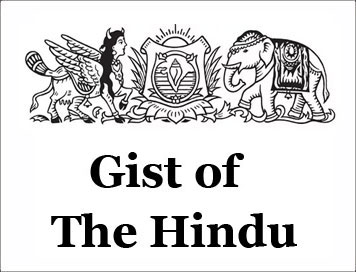
Gist of The Hindu: February 2016
Where the mind is without fear
Prime Minister Narendra Modi, while addressing Indian-origin
professionals in Silicon Valley, argued that this is brain gain, as millions of
successful Indians in the U.S. bring back knowledge to India. There is truth to
this assertion. India should then cherish the dramatic increase in the number of
Indian students in the U.S., from 31,743 in 1995 to more than 1,02,000. The
discussion of brain gain versus brain drain misses something potentially far
more important, however: the issue of a domestic brain trap. Brain trap is a
result of the archaic educational, social, and economic systems that stifle most
young minds from blossoming into creative thinkers and highly productive
citizens. One could argue that the millions of successful Indians in the U.S.
would not have achieved much success if they had remained in India. This
includes me. Unlocking the enormous domestic brainpower will trump any brain
gain.
There are many plausible reasons for brain trap. One
important reason is the process by which an individual’s inquisitiveness is
repeatedly snubbed from childhood. Often this is a result of strict adherence to
social norms at home and is carried over to schools and workplaces. Case in
point: In a gathering that I attended, a spiritual leader said, “Indian culture
is the greatest in the world.” In response, a 6-year-old child innocently asked,
“Why?” Obviously stumped by the question, the leader said, “Children in Indian
culture respect elders and do not disagree or talk back.” The child nodded her
head in acceptance.
Unfortunately, the damage begins there. Obedience is valued
more than the child’s inquisitiveness. We assume disagreeing is disrespectful
and obedience is a greater trait than inquisitiveness. Deeply held beliefs are
blindly transferred to children. This obedience gets amplified in schools. Fear
is embedded in the psyche of the student both at home and school and the ability
to think beyond the norms is curtailed from childhood. Fear manifests itself in
many forms and one is that of academic stress due to hyper-competition.
Teachers play an extraordinary role in shaping students. If
India wants to unlock the brain trap, then it must invest massively in teachers
and teacher training. That begins by acknowledging the importance of creativity,
introducing teaching and testing methods that encourage inquisitiveness, and
rewarding teaching innovations. In India, professors are expected and
incentivised to get PhDs. But, it is unclear if there is any greater focus on
creativity or academic research in most places. Professors who emphasise
research and publish papers with students should be recognised and rewarded.
The business leaders and industry associations like NASSCOM
lament the lack of soft skills or critical thinking among graduating students.
Often critical thinking skills are equated with math or science-related fields,
while placing very little emphasis on critical thinking skills rooted in
economics or the liberal arts education. Both are essential.
Despite recommendations, there has been little meaningful
progress. It is well understood that students develop leadership skills when
they are exposed to societal and economic problems. There are numerous
assumptions, biases, inconsistencies, incomplete information, and counter
arguments that can cloud judgment. Therefore, to make informed decisions,
students need to learn to make logical arguments, provide evidence and identify
limitations, recognise different viewpoints, develop skills to disagree
respectfully, and to communicate effectively. Unfortunately, engineering and
science do not always promote this kind of critical thinking.